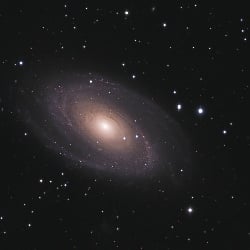Image credit: M-81 by
Tom Davis. Draw a line from the left bottom star through the top right star of the
Big Dipper's
bowl then extend it roughly the same distance upward and you'll see the location of this magnificent winter galaxy, the eighty first entry in Charles
Messier's
catalog, known as M-81. It was first identified in the late 1700's by German astronomer Johann
Bode
, so it's also sometimes knownn as Bode's Nebula.
Located only 12 million light years from Earth, a relative stone's throw by intergalactic distances, M-81 is one of the brightest galaxies visible from in the night sky and can be
spotted
from a dark site, far from any city lights, without need for any optical assistance.
This picture was photographed by astrophotographer
Tom Davis
, from his Inkom, Idaho home in late January 2006 during a clear-sky break in an otherwise cloudy winter season. Tom photographed through a six inch, f/7 Astro-Physics refractor with a SBIG ST-10XME three mega-pixel camera.
M-81 exhibits beautifully symmetrical spiral arms and numerous dark lanes of
dust
in this 2.5 hour exposure. Some of these dusty ribbons may be evidence of interaction with its companion galaxy,
M-82
, which also shows signs of disturbance that is thought to be caused by M-81.
Do you have photos you'd like to share? Post them to the Universe Today astrophotography forum or
them, and we might feature one in Universe Today.
Written by
R. Jay GaBany
 Universe Today
Universe Today
